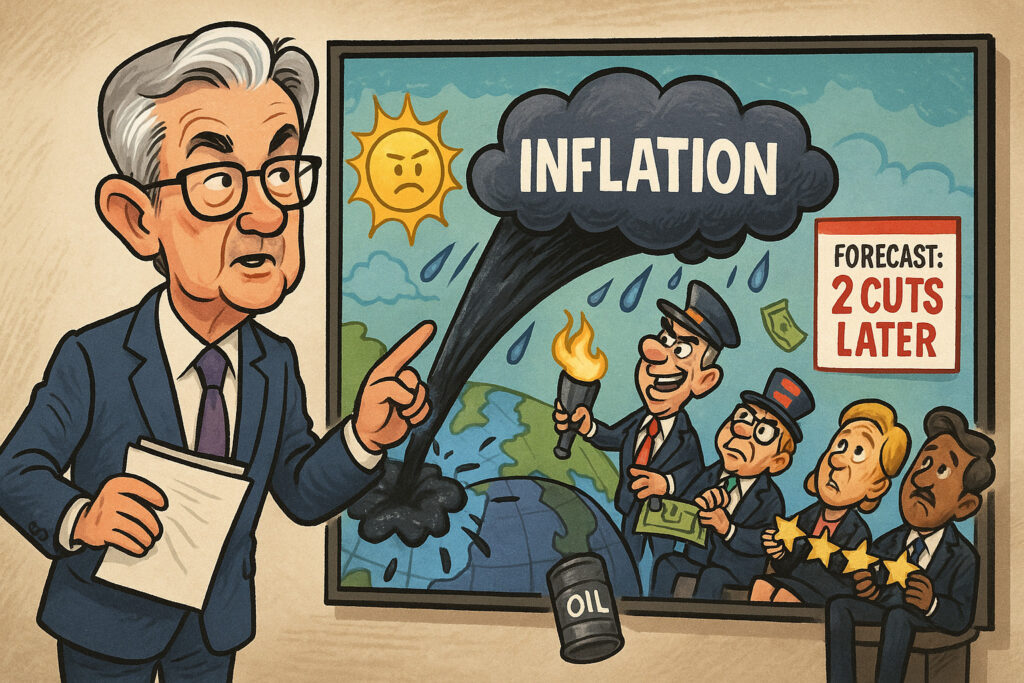Introduction
On June 18, 2025, the U.S. Federal Reserve held its benchmark interest rate steady in the range of 4.25% to 4.50%, maintaining its cautious stance amid a complex inflation and growth landscape. While refraining from an immediate rate move, the central bank revised its Summary of Economic Projections (SEP), signaling two quarter-point cuts before the end of the year—down from the previously expected three. The revised dot plot reflected growing internal divergence and market sensitivity to inflation data.
The Fed’s statement emphasized a continued data-dependent approach, acknowledging recent progress in inflation moderation but underlining the persistence of core price pressures and global uncertainty stemming from geopolitical instability.
This article unpacks the Fed’s decision, the updated economic projections, and the ensuing market reactions across asset classes—from equities and bonds to currencies, commodities, and crypto. It also evaluates investor expectations for the second half of 2025 and the evolving macroeconomic narrative.
Policy Statement: A Balanced Message
The Federal Open Market Committee (FOMC) voted unanimously to hold rates steady, citing stable but uneven inflation progress. The official statement noted:
- Headline CPI continues to ease, most recently printing at 2.4% YoY in May.
- Core PCE remains elevated at 2.8%, slightly above the Fed’s comfort zone.
- Labor market remains tight, but job creation is decelerating.
Chair Jerome Powell, in the post-meeting press conference, emphasized patience: “We are not declaring victory on inflation, but we do see encouraging signs.”
The shift from three projected cuts to two in the SEP underscores caution. Policymakers remain concerned about oil-driven price volatility and housing-related inflation persistence.
Market Reaction: Equities Rebound After Initial Dip
Equity markets initially sold off following the more hawkish tone in the dot plot but rebounded as Powell’s remarks reassured investors. By market close:
- S&P 500: +0.5% to 5,215.40
- Nasdaq Composite: +0.7% to 16,288.35
- Dow Jones: +0.3% to 39,240.22
Cyclical sectors led the rebound—especially consumer discretionary, industrials, and financials. Technology shares gained on easing rate uncertainty, with semiconductors and cloud services outperforming.
Bond Market: Curve Flattens on Revised Dot Plot
Treasury yields moved modestly but meaningfully:
- 2-year yield: +6 bps to 4.92%
- 10-year yield: +3 bps to 4.38%
The flattening yield curve reflects market recalibration to a slower pace of easing. The bond market is now pricing just under two 25 bps cuts in 2025, down from expectations of three in early Q2.
The MOVE Index dropped 4%, indicating reduced interest rate volatility expectations following Powell’s comments.
Dollar and Currency Markets: Greenback Gains
The U.S. Dollar Index (DXY) rose 0.3% to 106.20, driven by reduced expectations for rate cuts and rising U.S. real yields. The dollar gained against most major currencies:
- EUR/USD: Fell to 1.0635
- GBP/USD: Dropped to 1.2630
- USD/JPY: Rose to 159.8
Emerging market currencies were mixed. Latin American exporters saw modest gains on carry trade demand, while Asian currencies retreated due to dollar strength.
Commodities: Mixed Reaction
Commodities posted mixed results:
- Gold: -0.4% to $2,345/oz as rate-cut bets faded slightly
- Oil: +0.9% to $92.40/barrel amid lingering Middle East tension
- Copper: Flat at $9,850/ton
The market now sees a potential floor for crude oil if Fed cuts are delayed and geopolitical tensions persist. Gold’s decline reflected a shift toward risk-on sentiment and stronger real yields.
Crypto Markets: Mild Rally
Cryptocurrencies rallied modestly on Fed clarity and tech stock strength:
- Bitcoin: +1.9% to $66,700
- Ethereum: +2.1% to $3,480
Investor appetite for crypto rebounded after a week of consolidation, with Ethereum ETF optimism and stable macro signaling boosting sentiment.
Altcoins and DeFi tokens saw mixed performance, reflecting broader rotation within digital assets.
Updated Economic Projections
The Fed’s June SEP provided the following key figures:
- 2025 GDP Growth: Revised up to 2.1% from 1.9%
- Unemployment Rate (Year-end): 4.1%, unchanged
- Core PCE Inflation (Year-end): 2.6%, up from 2.5%
- Federal Funds Rate (Median, Year-end): 4.25% (implying two 25 bps cuts)
This subtle upward revision to inflation and growth suggests resilience but also lingering price stickiness.
Investor Outlook and Asset Allocation
Institutional managers are adjusting positioning:
- Increased allocation to U.S. large-cap equities, especially financials and industrials
- Modest reduction in long-duration bonds
- Preference for dollar-denominated assets and dividend-yielding stocks
Hedge funds report building tactical equity exposure ahead of Q2 earnings season, while pension funds remain underweight duration in core fixed income.
Real estate investment trusts (REITs) and utilities showed muted responses, still weighed by elevated real rates.
Central Bank Divergence Widens
While the Fed remains cautious, the ECB and Bank of Canada have already initiated easing cycles. The Bank of England remains on hold but is expected to follow suit by Q3.
This divergence in policy is contributing to FX volatility and capital rotation, with global investors increasingly seeking U.S. yield safety.
Developed market rate spreads widened modestly, increasing pressure on EM central banks to maintain or raise rates to prevent capital flight.
Conclusion
The June 18 FOMC meeting marked a subtle but significant shift in U.S. monetary policy expectations. While the Fed kept rates unchanged, the new guidance—signaling only two cuts in 2025—underscores growing uncertainty around inflation’s persistence and global macro risks.
Markets initially reacted with caution but stabilized as Chair Powell reinforced a patient, data-driven approach. The policy tone is one of cautious optimism—balancing inflation vigilance with a commitment to growth.
Key takeaways for investors:
- Fed remains on hold with a reduced easing outlook
- Treasury curve flattens as front-end yields rise
- Dollar strengthens on revised rate trajectory
- Equities rebound on Powell’s reassurance and resilient growth
Looking ahead, the path of policy normalization will hinge on:
- Monthly inflation readings, especially core PCE and housing
- Labor market resilience and wage growth
- Geopolitical risks affecting commodity prices
- Second-quarter corporate earnings and forward guidance
For now, the Fed’s message is clear: rate cuts are coming—but only if inflation behaves. As the window for policy easing narrows, investors must remain agile, data-focused, and diversified.
